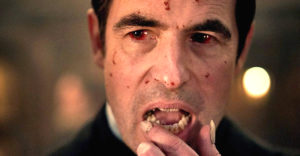“I ate his liver with some fava beans and a nice chianti,” whispers Hannibal Lecter, before making that scary teeth-sucking noise. But what makes Lecter our favourite moral monster is not that he eats people; it’s that he gruesomely murders them first. Would something be wrong with him eating a human liver taken from a dead body?
Now, TV foodie Gregg Wallace is not someone I had ever thought of as being in the same category as Lecter. Nor indeed, as some kind of public intellectual cum satirist, reflecting on the great social issues of the day. Yet his recent Channel 4 mockumentary on eating human flesh was clearly a satirical social commentary on the cost-of-living crisis. In it, people are forced to sell slices of their bodies; “with money from her donation, Gillian will be able to pay for two weeks of energy bills”. At one point, Wallace and Michel Roux consider whether the lifestyle of their dinner might affect the flavour: Alison, a former NHS nurse tasted a bit stressed, but children were the most succulent. “Our babies taste best with gravy,” explained the fictional start-up company, Good Harvest.
The show didn’t put me off my dinner, as it did many predictably outraged viewers. It was clearly a reference to Jonathan Swift’s A Modest Proposal, in which he proposed that poor Irish children be sold to the rich for food: “A young healthy child well nursed is, at a year old, a most delicious nourishing and wholesome food, whether stewed, roasted, baked or boiled.” People were outraged then, too.
Cannibalism has a long, politically charged history. In the early modern era of colonialism, the figure of the cannibal became the representative Other to Western civilisation. Soon after Columbus discovered the New World, the cannibal became a sensationalist spur to much European moralising about what counted as right behaviour. In this era, considerable legal attention was given to shipwrecked colonisers forced to eat their dead colleagues. As the Romanian philosopher Catalin Avramescu argues in his history of cannibalism, these extreme situations represented a crisis of Western civilisation, a descent into the kind of savagery only seen, or perhaps just imagined, in the distant societies that sailors encountered.
Cannibalism thus represented the boundary, and thus, to some extent, the defining feature of European moral consciousness. Shakespeare’s Caliban in The Tempest — whose name, some argue, derived from an anagram of the Spanish for cannibal — is a very obvious counterpoint to the “civilised” colonialist, Prospero. Half man, half monster, Caliban is “not honour’d with a human shape”, and so is enslaved by Prospero. Cannibalism became a key link in the moral justification of slavery.
I find cannibalism fascinating. Partly, I suppose, because as a high-church Christian, and one for whom the Eucharist is at the centre of his spiritual life, the invitation to consume the body and blood of Christ is a daily source of nourishment, albeit spiritual — that caveat a source of endless medieval dispute. Early critics of Christianity made much of the cannibalistic vibe of passages like this from John’s Gospel: “Very truly, I tell you, unless you eat the flesh of the Son of Man and drink his blood, you have no life in you.” I have often wondered why we who believe in transubstantiation do not experience at least a bat squeak of disgust when receiving the bread and wine.
Philosophically, though, cannibalism presents fewer issues than we might imagine. After all, if a body can be left to medical science, for the betterment of society, why can it not be left to feed the hungry? Where is the violation of the harm principle? The same may be true of something like incest. People say it is wrong because it may have negative genetic consequences, but those people don’t argue that incest with birth control is fine.
No, cannibalism is more a theological problem than a philosophical one because we treat human bodies — even after death — as in some way sacred. Those who blithely insist that after death anyone can do what they want with their bodies — throw them on the rubbish tip — are very much in the minority, and I often wonder how sincere they are. Even dead bodies are reckoned to bear some sort of imprint of the life that the body lived. That is why, in what remains at root a broadly Christian culture, bodies are treated with respect, not used as fresh meat for the butcher.
But in strictly ethical terms, the disgust with which we react to cannibalism is now reckoned to be a poor guide to moral assessment. That some may react to the thought of gay sex in the same way, for instance, is now widely understood to be, more or less, as morally insignificant as my child’s grimacing at eating something a little bit different. Disgust may originate in some evolutionary need to protect against infection, but outstays its welcome when translated into various forms of social othering.
Indeed, disgust seems highly illogical. You may kiss your partner on the head, nuzzling her hair, but then retch when you clean the same hair from the shower plug. Your mouth is constantly full of saliva, but we generally don’t like the idea of spitting into a glass and then drinking it. Intellectually, it’s hard to know the difference; viscerally, it matters.
Here we might recall Mary Douglas’s definition of dirt as “matter out of place”: what is called soil in the garden is called dirt on the kitchen floor. That is, our interpretation of things is rooted in a certain map of the world in which things have their place. Hair on the head, in its place: fine to kiss. Hair in the plug, out of place: disgusting. This is why conservatives, who tend to have a stronger sense of there being “a place for everything and everything in its place”, reference disgust more readily than liberals. And nowhere is this truer than the politics of the human body — transgender issues, for example. The breast-feeding man violates the conservative’s map of things.
Liberals argue that the “irrationality of disgust suggests it is unreliable as a source of moral insight”. But the limits of this viewpoint can be seen when it collides with cannibalism. Strict liberals may — philosophically at least — find no fault with the man who served tacos to his friends made with meat from his own amputated leg. My body, my choice and all that. But I doubt they would be first in the queue for that buffet.
What the response to Wallace’s documentary made clear is that strict rationality is not — and perhaps never will be — the fundamental basis of our morality. As conservative bioethicist Leon Kass put it, “repugnance is the emotional expression of deep wisdom, beyond reason’s power fully to articulate”. Yes, the liberal warning against disgust being weaponised against minorities is well made. But when used in the defence of human dignity, disgust can be a powerful moral ally. What begins as a biological reaction to a threat to our bodies can be a sign of a spiritual reaction to a threat to our souls.
Disclaimer
Some of the posts we share are controversial and we do not necessarily agree with them in the whole extend. Sometimes we agree with the content or part of it but we do not agree with the narration or language. Nevertheless we find them somehow interesting, valuable and/or informative or we share them, because we strongly believe in freedom of speech, free press and journalism. We strongly encourage you to have a critical approach to all the content, do your own research and analysis to build your own opinion.
We would be glad to have your feedback.
Source: UnHerd Read the original article here: https://unherd.com/



